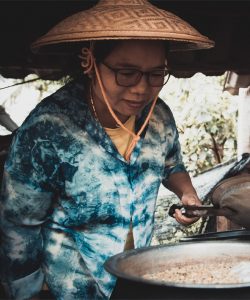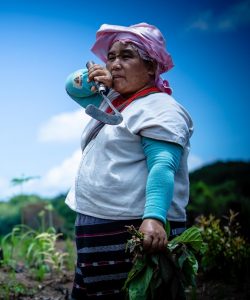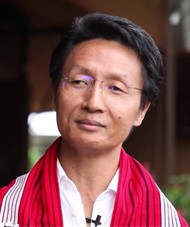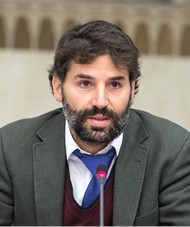“Land Tenure Security is the Foundation for Resilient and Sustainable Food Systems”-A Webinar on Indigenous Women as Global Game Changers

It has been widely acknowledged that the world’s dominant food systems are unsustainable: as key drivers of climate change, they generate adverse environmental, socio-economic, and health impacts on the entire planet. Not only are they responsible for massive greenhouse gas emission and biodiversity loss worldwide, but they also contribute to economic exploitation, increased inequalities, conflict, human rights violations, and food insecurity.
In contrast, Indigenous Peoples’ Food Systems belong to the most sustainable, resilient and equitable food systems in the world. They provide healthy and resilient diets, ensure food security with minimal environmental impact, promote social cohesiveness and a sense of belonging to the community through sharing and exchange of labor, and contribute to biodiversity conservation and enhancement. As key holders of Indigenous Knowledge and custodians of land, territories and resources, Indigenous Women are at the center of traditional food systems of Indigenous Communities. They play a key role in seed conservation, sustainable resource management, and the intergenerational transmission of knowledge and practices related to food security in their communities.
These are some of the key insights that emerged during the webinar “Celebrating and Amplifying Her Stories through Indigenous Food Systems”, co-organized by the Asia Indigenous Peoples Past (AIPP), Indigenous Knowledge and Peoples of Asia (IKPA), the Swedish Society for Nature Conservation (SSNC), Global-Hub on Indigenous Peoples’ Food Systems, the International Land Coalition (ILC) Asia, and the UN Food and Agriculture Organization (FAO), on the occasion of the International Day of the World’s Indigenous Peoples on 9 August 2021. The online event, attended by over 75 participants from more than 20 countries, aimed at increasing the visibility of the roles and contributions of Indigenous Women in food systems and sustainable environmental management, through contributions from local, regional and international experts on Indigenous Knowledge and food systems.
Voices from the Ground: HerStories on Indigenous Food, Seeds and Culture
Three speakers from Northern Thailand shared local stories and initiatives from Indigenous Women on the ground.

Ms. Wanitchaya Kantayuang, president of the Shan/Tai Yai Women’s Network and Committee Member of Indigenous Women’s Network in Thailand (IWNT), illustrated the rich traditional wisdom on food preservation held by Shan Indigenous Women at the example of a well-known traditional Shan dish, Thua Nau, or fermented soybeans, which ensures family food security even in times of crisis. The unique knowledge of Shan women on food and seed preservation enhances their dignity and status in the community, and thus, contributes to greater gender equality. Ms. Wanitchaya highlighted the vital importance of land rights for Indigenous Women since land is the foundation for the conservation of seeds and production of food. She elaborated on challenges facing the traditional food system of Shan women today, such as a decline in knowledge transfer, climate change, biopiracy, and growing domination of commercial seeds. The speaker further made recommendations how to address these challenges, e.g., through the inclusion of Indigenous Knowledge in local school curricula, the decentralization of land management to local governments, and the recognition of customary land rights of Indigenous Peoples.

Mr. Kraisit Sitthichodok, co-founder of the “Akha Dae Khong” learning center in Chiang Rai Province of Thailand, introduced the Akha’s “nine-layer” agriculture, in which nine different layers of plant heights are distinguished in the shifting cultivation field, with each layer performing different ecological functions. The Akha traditional agriculture, which produces at least 22 different crop varieties, is strongly linked to culture and spirituality: it not only forms an integral part of the Akha daily life, but it is part of a larger whole, encompassing humans, nature, and supernatural powers the like. Traditionally, Indigenous Women are in charge of the entire crop production process, from planting to seed harvest. Nowadays, however, the nine-layer agriculture has largely disappeared due to a number of factors, such as climate change, the promotion of monocultures, and increasing market orientation of Indigenous Communities. As a response, the Akha Dae Khong center has been established as a learning space on the Akha traditional lifestyle for the youth and interested outsiders. The speaker emphasized the importance of land rights of Indigenous Peoples and the participation of all stakeholders in the preservation of Indigenous Knowledge, as well as the need to protect indigenous seeds from exploitation by commercial interests.

Ms. Chankham Bongkotvijitrung, knowledge keeper and practitioner from the Lua Community of La-oob, Mae Hong Son Province of Thailand, stressed the significance of shifting cultivation for the Lua. Combining short cultivation periods and long fallow periods of 7 to 8 years with a balanced use of natural resources, the shifting cultivation cycle enables the production of more than 30 different kinds of edible crops. For the Lua, the shifting cultivation field is not only source of food, but also a socio-cultural learning space to acquire Indigenous Knowledge on ecosystem management and Lua traditional culture. Lua women are key knowledge transmitters and play an essential role in seed selection, storage and conservation. Traditionally, cotton trees, threads and woven clothes were of great significance for the Lua. Nowadays, however, the trees are disappearing from the community as the youth is no longer interested in traditional practices. The speaker emphasized the importance of fostering a transgenerational learning process, in particular, on the preservation of seeds to prevent their extinction.
A highlight of the webinar was the launch of the photo book “Indigenous Women, Ancestral Wisdom” by AIPP, a co-production of Indigenous Knowledge and Peoples of Asia (IKPA), the Indigenous Media Network in Thailand (IMN), and the Indigenous Peoples Foundation for Education and Environment (IPF), supported the Norwegian Agency for Development Cooperation (Norad). In colorful pictures and stories in two languages (Thai/English), the photo journal is documenting the experiences and initiatives presented by the three speakers from Northern Thailand, illustrating the contributions of Shan, Lua, and Akha Indigenous Women to Indigenous Seed and Food Systems, as well as their linkages to culture, spirituality, knowledge transmission, biodiversity conservation and food security.
Indigenous Women as Change-makers: Regional and International Dimensions
Featuring three experts on Indigenous Peoples and their food systems from different organizations and countries, the webinar then broadened its focus from a local to regional and international perspectives.

Gam A. Shimray, Secretary General of AIPP, reflected on the internal and external dimensions of the call for a new social contract, the key theme of the 2021 International Day of the World’s Indigenous Peoples. The call’s internal dimension relates to the need for indigenous communities to undergo a process of reflection when asserting their rights to self-determination and recovering their indigenous wisdom. A process of deep reflection is required to address disparities and inequalities that persist within indigenous communities, in particular with regard to the participation of women in decision-making. The external aspect of the call refers to Indigenous Peoples’ relationships with outside entities, particularly states. Global debates around climate change, biodiversity conservation, and ecosystem restoration need to acknowledge that Indigenous Women are major agents of change in these fields. Mr. Shimray pointed out that it is essential to provide space for Indigenous Women to fully exercise their agency, which, in turn, allows Indigenous Peoples to maximize their engagement with external actors.

In his talk, Yon Fernández-de-Larrinoa, the head of the FAO Indigenous Peoples Unit, introduced the Global-Hub on Indigenous Peoples’ Food Systems, launched in 2020 by the FAO. The hub, which brings together 19 Indigenous and non-indigenous organizations from different countries, aims to create knowledge on Indigenous Food Systems and to provide evidence-based contributions to policy discussion and research agendas. In May 2021, the White/Wiphala paper on Indigenous Peoples’ Food Systems was drafted under the lead of the Global-Hub, with over 60 contributions from Indigenous Organizations, experts and institutions from 6 sociocultural region. The document identifies the unique characteristics of Indigenous Food Systems, drivers that threaten their continuation, as well as contributions of Indigenous Peoples to the current debate on sustainability. It underlines that Indigenous Women form the core of Indigenous Food Systems, due to their central role in territorial management and the intergenerational transfer of knowledge. Finally, recommendations are made to the 2021 United Nations Food Systems Summit, in particular, to recognize Indigenous Food Systems as game changing solutions to global challenges.

Ms. Kuluipa Akmatova, member of the International Land Coalition (ILC) Asia, highlighted the intimate link between healthy ecosystems, Indigenous Peoples and sustainable food systems. The speaker introduced the ILC Asia Ecosystem Restoration Platform and its 16 member organizations from 8 countries in Central, South and Southeast Asia. The platform was created as a response to increasing economic pressure and the current climate crisis that threatens ecosystems worldwide. Its major goal is to strengthen the tenurial security of communities as a means to ensure and recognize their efforts in ecosystem management. In her talk, Ms. Akmatova stressed the key role of Indigenous Women in maintaining the sustainability of local environments and the well-being of their communities.
While the webinar shed light on Indigenous Food Systems and the contributions of Indigenous Women from different angles, a clear message emerged across the speaker: It is of utmost importance to secure and promote Indigenous Women’s rights to land, territories and resources which are the cornerstones of sustainable food systems and resilient communities.
For more information, please contact the following members of Environment Programme of AIPP:
- Lakpa Nuri Sherpa, Environment Programme Coordinator at nuri@aippnet.org
- Pirawan Wongnithisathaporn, Environment Programme Officer at pirawan@aippnet.org
- Prem Singh Tharu, Environment Programme Officer at prem@aippnet.org
Facebook
Twitter
LinkedIn
Pinterest

